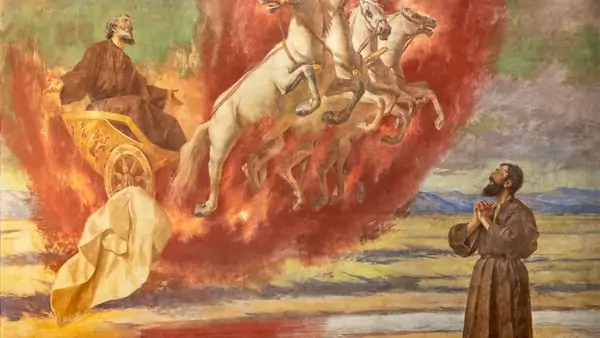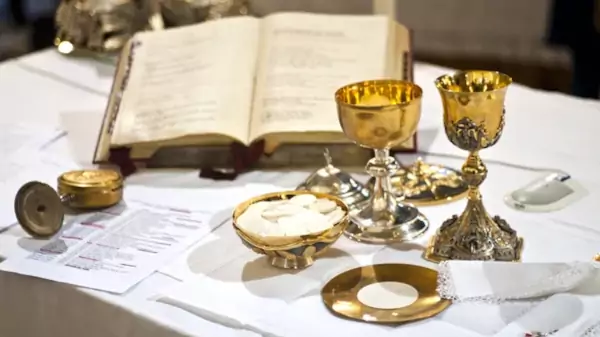- Presented by Ranaivomanantsoa Harilanto
- Category: Ordinary Time
-
Also available:


First Reading
The Book of Joshua (Jos 24: 1-2a, 15-17, 18b)
We will serve the LORD, for he is our God.
Joshua gathered together all the tribes of Israel at Shechem,
summoning their elders, their leaders,
their judges, and their officers.
When they stood in ranks before God,
Joshua addressed all the people:
“If it does not please you to serve the LORD,
decide today whom you will serve,
the gods your fathers served beyond the River
or the gods of the Amorites in whose country you are now dwelling.
As for me and my household, we will serve the LORD.”
But the people answered,
“Far be it from us to forsake the LORD
for the service of other gods.
For it was the LORD, our God,
who brought us and our fathers up out of the land of Egypt,
out of a state of slavery.
He performed those great miracles before our very eyes
and protected us along our entire journey
and among the peoples through whom we passed.
Therefore we also will serve the LORD, for he is our God.”
— The word of the Lord.
Responsorial Psalm
Ps 34: 2-3, 16-17, 18-19, 20-21
Taste and see the goodness of the Lord.
I will bless the LORD at all times;
his praise shall be ever in my mouth.
Let my soul glory in the LORD;
the lowly will hear me and be glad.
The LORD has eyes for the just,
and ears for their cry.
The LORD confronts the evildoers,
to destroy remembrance of them from the earth.
When the just cry out, the LORD hears them,
and from all their distress he rescues them.
The LORD is close to the brokenhearted;
and those who are crushed in spirit he saves.
Many are the troubles of the just one,
but out of them all the LORD delivers him;
he watches over all his bones;
not one of them shall be broken.
Second Reading
Letter of Saint Paul to the Ephesians (Eph 5: 21-32)
This is a great mystery, but I speak in reference to Christ and the church.
Brothers and sisters:
Be subordinate to one another out of reverence for Christ.
Wives should be subordinate to their husbands as to the Lord.
For the husband is head of his wife
just as Christ is head of the church,
he himself the savior of the body.
As the church is subordinate to Christ,
so wives should be subordinate to their husbands in everything.
Husbands, love your wives,
even as Christ loved the church
and handed himself over for her to sanctify her,
cleansing her by the bath of water with the word,
that he might present to himself the church in splendor,
without spot or wrinkle or any such thing,
that she might be holy and without blemish.
So also husbands should love their wives as their own bodies.
He who loves his wife loves himself.
For no one hates his own flesh
but rather nourishes and cherishes it,
even as Christ does the church,
because we are members of his body.
For this reason a man shall leave his father and his mother
and be joined to his wife,
and the two shall become one flesh.
This is a great mystery,
but I speak in reference to Christ and the church.
— The word of the Lord.
Gospel
Alleluia, alleluia.
Your words, Lord, are Spirit and life; you have the words of everlasting life.
Alleluia, alleluia.
Gospel of Jesus Christ according to Saint John (Jn 6: 60-69)
Master, to whom shall we go? You have the words of eternal life.
Many of Jesus’ disciples who were listening said,
“This saying is hard; who can accept it?”
Since Jesus knew that his disciples were murmuring about this,
he said to them,
“Does this shock you?
What if you were to see the Son of Man ascending
to where he was before?
It is the spirit that gives life,
while the flesh is of no avail.
The words I have spoken to you are Spirit and life.
But there are some of you who do not believe.”
Jesus knew from the beginning the ones who would not believe
and the one who would betray him.
And he said,
“For this reason I have told you that no one can come to me
unless it is granted him by my Father.”
As a result of this,
many of his disciples returned to their former way of life
and no longer accompanied him.
Jesus then said to the Twelve,
“Do you also want to leave?”
Simon Peter answered him,
“Master, to whom shall we go?
You have the words of eternal life.
We have come to believe
and are convinced that you are the Holy One of God.”
— The Gospel of the Lord.
- Presented by Ranaivomanantsoa Harilanto
- Category: Ordinary Time
-
Also available:


First Reading
Second Letter of Saint Paule to the Thessalonians (2 Thes 1: 1-5, 11-12)
The name of our Lord Jesus may be glorified in you, and you in him.
Paul, Silvanus, and Timothy to the Church of the Thessalonians
in God our Father and the Lord Jesus Christ:
grace to you and peace from God our Father
and the Lord Jesus Christ.
We ought to thank God always for you, brothers and sisters,
as is fitting, because your faith flourishes ever more,
and the love of every one of you for one another grows ever greater.
Accordingly, we ourselves boast of you in the churches of God
regarding your endurance and faith in all your persecutions
and the afflictions you endure.
This is evidence of the just judgment of God,
so that you may be considered worthy of the Kingdom of God
for which you are suffering.
We always pray for you,
that our God may make you worthy of his calling
and powerfully bring to fulfillment every good purpose
and every effort of faith,
that the name of our Lord Jesus may be glorified in you,
and you in him,
in accord with the grace of our God and Lord Jesus Christ.
— The word of the Lord.
Responsorial Psalm
Ps 96: 1-2a, 2b-3, 4-5
Proclaim God’s marvelous deeds to all the nations.
Sing to the LORD a new song;
sing to the LORD, all you lands.
Sing to the LORD; bless his name.
Announce his salvation, day after day.
Tell his glory among the nations;
among all peoples, his wondrous deeds.
For great is the LORD and highly to be praised;
awesome is he, beyond all gods.
For all the gods of the nations are things of nought,
but the LORD made the heavens.
Gospel
Alleluia, alleluia.
My sheep hear my voice, says the Lord; I know them, and they follow me.
Alleluia, alleluia.
Gospel of Jesus Christ according to Saint Matthew (Mt 23: 13-22)
Woe to you, blind guides.
Jesus said to the crowds and to his disciples:
“Woe to you, scribes and Pharisees, you hypocrites.
You lock the Kingdom of heaven before men.
You do not enter yourselves,
nor do you allow entrance to those trying to enter.Woe to you, scribes and Pharisees, you hypocrites.
You traverse sea and land to make one convert,
and when that happens you make him a child of Gehenna
twice as much as yourselves.Woe to you, blind guides, who say,
‘If one swears by the temple, it means nothing,
but if one swears by the gold of the temple, one is obligated.’
Blind fools, which is greater, the gold,
or the temple that made the gold sacred?
And you say, ‘If one swears by the altar, it means nothing,
but if one swears by the gift on the altar, one is obligated.’
You blind ones, which is greater, the gift,
or the altar that makes the gift sacred?
One who swears by the altar swears by it and all that is upon it;
one who swears by the temple swears by it
and by him who dwells in it;
one who swears by heaven swears by the throne of God
and by him who is seated on it.”
— The Gospel of the Lord.
- Presented by Ratovoarivelo Ndrasantsoa Marie Frédeline
- Category: Deepening faith
-
Also available:


We're pilgrims on our way to the Jubilee Year; it's a new power and inspiration for our spiritual life. Remember that God needs us, so prayer knocks at the door of our heart, we receive Elijah's garment of righteousness like Elisha. Dare and decide to leave behind and overcome everything that prevents us from living in full communion with God. Catechesis on the prayer of Elijah, in collaboration with Fr Ramamonjisoa Herizo Élie.
- Presented by DIMBINIAINA Tsilavina Jules
- Category: Meditations
-
Also available:


20th Sunday of the Year - B : My flesh is edible, my blood is drinkable; your word, Lord, is truth; sanctify us with your justice. The sacred bread is enough to satisfy everyone's hunger, as it says in Proverbs: Come and eat my bread, and drink the wine that I have mixed. Abandon ignorance and you will live; and go on the path of enlightenment". My flesh is edible and my blood is drinkable, says Jesus; eating the Body of Jesus and His Blood will give you many graces and you will inherit eternal life. It takes dignity to receive the Eucharist, it takes faith, it takes humility...
Subcategories
Message from the Bishops at the end of the Pilgrimage

Dear brothers and sisters in Christ, You who have come in such large numbers to take part in this national pilgrimage, as well as all of you who are following it from home through the media. We, the bishops of Madagascar, would like to express our deep gratitude to you for having responded to our invitation and for having brought this jubilee initiated by Pope Francis to life spiritually. With you, we take up Mary's song: ‘My soul exalts the Lord’ and we repeat with her: ‘What shall I repay the Lord for all the good he has done me?’....
Read more ...Love and Salvation

Christmas is a great joy, because it is the love of God that has come to us, proclaims Fr. Bizimana Innocent, Provincial Superior of the Salesians Don Bosco of Madagascar and Mauritius, presenting his Christmas greetings. Salvation is accomplished, so life is not in danger of disappearing. It is this love and this salvation that we wish to fill our life so that we have peace.
Read more ...Zatti, our brother

The short film "Zatti, our brother" (Argentina, 2020) focuses on one of the most difficult episodes of his life. We are in Viedma, in 1941: at the age of 60, Zatti is forced to leave the hospital he has attended for decades. His faith and strength are tested.
Read more ...© 2025 Radio Don Bosco




